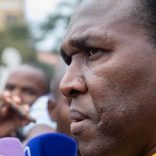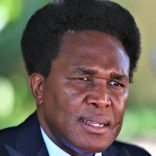Mozambique: Chapo swears in new members of Human Rights Commission
Internally displaced in central Mozambique still afraid to return home

Lusa
People displaced by fighting in Sofala province in central Mozambique are still afraid to return home a week after the suspension of the Renamo compulsory disarmament policy, claiming that “the measure has not yet restored safety”.
“Security has not been restored. We have to go to our machambas [gardens] during the day, with curfews in the late afternoon, just like in the 16-year [civil] war,” Mateus Pedro, a Vunduzi resident now staying in the town of Gorongosa told Lusa by telephone.
Hundreds of families fled the clashes between the defence and security forces and Renamo in the foothills of the Gorongosa mountains, an area only now receiving a trickle of returnees displaced by the 2013-2014 political and military crisis involving the government and Renamo.
The recent clashes between Mozambican police special forces and Renamo provoked a new wave of displaced people in late October in Gorongosa and Inhaminga, Sofala province.
Dozens of families left their homes in Cheringoma, the district headquarters of Inhaminga, when state forces began trying to disarm a Renamo military base there.
“What stopped were the shootings. The military [units of riot police and the Special Operative Group who ran operations] continue to carry weapons on patrol and warn that farmers should return to the village at night,” Adamo Maiosa, another inhabitant of Vunduzi who has moved to Gorongosa and now survives on food he earns in exchange for yard work, told Lusa.
Last year, Gorongosa residents displaced by the first wave of political violence were faced with famine, and only survived by eating green mangoes and wild tubers after being forced abandon their crops.
This year, the displaced are still able to work their gardens, but have to travel up to 60 kilometres every day between the town of Gorongosa and Vunduzi to tend their vegetable gardens.
Adelino Fernandes, priest of the Inhaminga Congregation of the Sacred Heart, told Lusa that the village where he lives “is still deserted” since it was abandoned by the population in October, adding that the people prefer to stay in the woods or elsewhere, although there have been no military operations since then.
In Muxungué, an area affected by the political and military crisis of 2013–2014, positions in the Save and Ripembe river valleys are being held by the military, but without any “noticeable new offensives,” local priest José Luis told Lusa.
Police started the Renamo disarmament operation on October 9 when special forces surrounded and raided the house of Afonso Dhlakama in Beira and disarmed and detained members of his personal guard for several hours.
The siege ended only when Afonso Dhlakama handed over his bodyguard’s weapons and a group of mediators facilitated dialogue between Renamo and the government. The opposition leader has not been seen in public since.












Leave a Reply
Be the First to Comment!
You must be logged in to post a comment.
You must be logged in to post a comment.